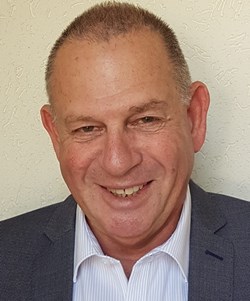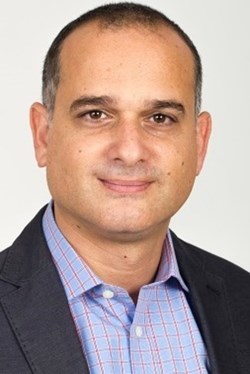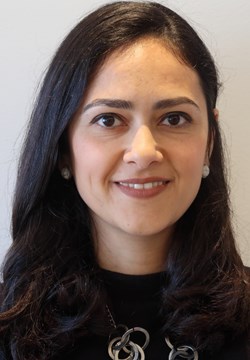
Photo of neurosurgery from healthline.com
If you’re ever unfortunate enough to require brain surgery, Israeli startup Nurami Medical has got you covered – literally.
The Haifa-based company has developed a patch made of synthetic, biodegradable nanofibers meant to be affixed to the dura mater – the protective membrane underneath the skull that keeps the brain and spinal cord safe – after cranial neurosurgery.
Brain surgery requires cutting through the dura, so a “bandage” of some sort must be placed to protect against bacteria, accelerate healing and keep cerebral spinal fluid from leaking.
Nurami’s nanofiber patches mimic the dura mater in a way that’s safer and less expensive than the animal collagen-based products currently used for post-brain surgery recovery, the company’s CEO Hannoch Marksheid tells ISRAEL21c.

Collagen, a structural protein that holds tissue together in all mammals, is what gives our skin strength and elasticity. Nurami’s proprietary synthetic patches based on copolymers (“macromolecules” composed of repeated subunits) are three to six times thinner than the animal collagen-based alternative and eliminate the risk of animal-derived contamination.
Because Nurami’s patches are biodegradable, they won’t need to be removed from the brain. They simply dissolve into the body when the tissue has healed.
Nurami’s patches will be sold under the brand name ArtiFascia (for “artificial fascia,” the fascia being the connective tissue beneath the skin).
“It’s much more similar to the original dura,” Marksheid explains. That makes it “easier for surgeons to place it where they want it.”
Nurami’s ArtiFascia also contains a biological sealant that protects against bacteria and cerebral spinal fluid leakage. With traditional collagen-based patches, a sealant must be sprayed on separately. Nurami’s all-in-one approach further simplifies the work of surgeons.
Other uses of the patch
Nurami is starting with the brain, but its technology eventually could be used to protect and repair soft tissue anywhere in the body.
Some 75 percent of the human body consists of soft tissue and it often suffers damage, whether a superficial wound or inside soft-tissue organs such as the heart, liver and pancreas.
Nurami is focusing on the brain for now because it’s a market that “is clearly identified with an existing need,” explains Marksheid. Estimated at $1 billion a year, the market for dura substitutes is growing by seven percent every year, he adds.
Nurami conducted its first human trials with six people in the Czech Republic and is now continuing on to larger trials in Europe. The company is aiming for European approval by 2021 and in the US a year later.

Marksheid, the former CEO of biomedical company BioCep, was on his way to retirement in 2014 when two young entrepreneurs approached him: Amir Bahar, who has a PhD in neurobiology from the Weizmann Institute of Science and did a post-doc at Mount Sinai Medical Center in New York; and biomedical engineer Nora Nseir.
Bahar won a NARSAD Young Investigator Award in 2008 from the non-profit Brain and Behavioral Research Foundation. Nseir previously led the development of new nanofiber bone-graft technology at the Technion and Bonus BioGroup, and cofounded the Arab Women in Science non-profit forum.
Bahar and Nseir developed the technology that would become ArtiFascia while at Next Generation Technology, a startup incubator in Nazareth supported by the Israeli Economy Ministry’s Israel Innovation Authority to promote Arab and Jewish business collaboration.

The two cofounders made “tremendous progress in a very short time and with a limited budget,” Marksheid said, referring to what prompted him to make the decision to delay his retirement to become CEO of Nurami.
What makes ArtiFascia unique, he says, is that “the nanofiber mimics and is very similar to the native tissue of the body because of shape and size and form, so it allows better regeneration and faster healing for the tissue and also for the patient.”
The five-person Nurami Medical has raised a total of $4.5 million, including funding from the Israel Innovation Authority; the Alfred Mann Foundation, which specializes in commercializing medical products; and a Chinese investor.
The latter is key to helping Nurami penetrate the huge Chinese market.
“China has its own version of the FDA,” Marksheid points out, referring to the US Food and Drug Administration. “They require their own clinical studies and that manufacturing for those clinical studies be in China. Small medical-device companies like us usually identify and link up with a Chinese partner.”
For now, the six patients in Nurami’s Czech trial have completed surgery and six months of follow up.
The best news, says Marksheid: “All have been released from medical care.”
For more information click here.
